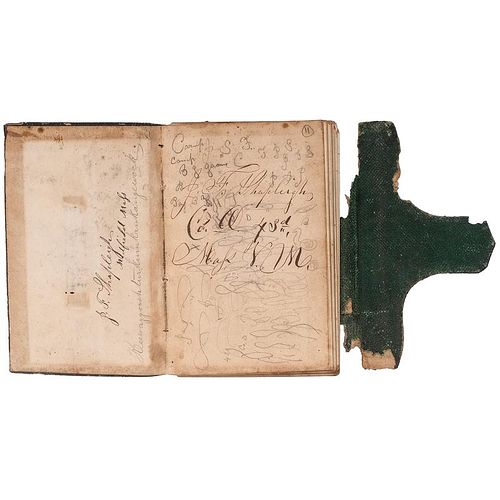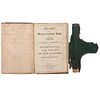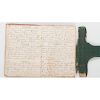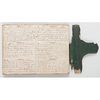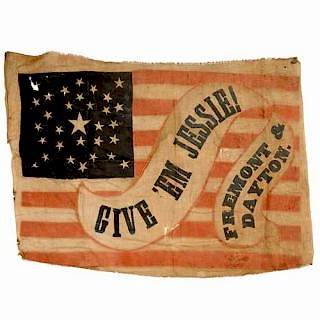Private James F. Shapleigh, Massachusetts 43rd Volunteers, 1863 Diary
About Seller
6270 Este Ave.
Cincinnati , OH 45232
United States
With offices in Cincinnati, Cleveland and Denver, Cowan’s holds over 40 auctions each year, with annual sales exceeding $16M. We reach buyers around the globe, and take pride in our reputation for integrity, customer service and great results. A full-service house, Cowan’s Auctions specializes in Am...Read more
Two ways to bid:
- Leave a max absentee bid and the platform will bid on your behalf up to your maximum bid during the live auction.
- Bid live during the auction and your bids will be submitted real-time to the auctioneer.
Bid Increments
| Price | Bid Increment |
|---|---|
| $0 | $25 |
| $500 | $50 |
| $1,000 | $100 |
| $2,000 | $250 |
| $5,000 | $500 |
| $10,000 | $1,000 |
| $20,000 | $2,500 |
| $50,000 | $5,000 |
| $100,000 | $10,000 |
About Auction
Nov 18, 2016 - Nov 19, 2016
Cowan's Auctions dawnie@cowans.com
- Lot Description
James F. Shapleigh was a 21-year-old carriage maker before he enlisted in the army as a private on August 25, 1861. After over a year of waiting for his regiment to form, he mustered into the 43rd MA Infantry, Co. D on September 12, 1862. The people of Boston paraded Shapleigh and his regiment down the street, waving their final goodbyes before they departed for the front. Shapleigh experienced fighting on several occasions and wrote about them in his daily journal. He describes being under fire, destroying the rebels' largest gun, capturing prisoners, and the wounded. Finishing his term of service, he mustered out of service on July 30, 1863. The journal comprises almost his entire military career, excluding only four months of his term of service.
In the early part of the war, the Confederacy paid little attention to North Carolina, so Union forces were able to "set up" at New Bern (also Newbern, New Berne). They damaged the vital Wilmington and Weldon Railroad, so Lee had to pay attention to the region. After his success at Fredericksburg, he felt he could spare a few men to try to rout the Union forces from North Carolina.
The Union garrisons along the coast were under the command of Gen. John Foster. The first attack on New Bern failed, and the Confederate forces set up a siege, setting up blockades and obstructions along the rivers to impede Union reinforcements. One relief expedition under Gen. Prince saw the rebel batteries and turned around. Gen. Spinola made another effort, but was turned back at Blount's Creek, returning to New Bern. Finally the USS Escort made its way past the batteries into Washington, delivering supplies and a Regiment of Rhode Island infantry. Two days later Foster made it back down to New Bern. At about the same time, the Confederate forces received requests for reinforcement, and left their siege positions.
Shapleigh describes the action from the front lines:
[Wednesday April 1, 1863] On guard today 'tis cold and windy. We have heard heavy firing at intervals all day in the direction of Little Washington. We with the other Regts. are under orders to march at an hours notice with 2 days rations.
[Thursday 2] We encountered no troubles from the rebs yesterday although the firing continued until after sunset. Today all is quiet....
[Friday 3] The firing commenced again early this morning and continued about 5 hours. It is very cold and windy. The dust flies across the parade ground so thick that we could cut it with a knife.
The next couple days they had reviews.
[Tuesday 7] Struck tents this morning and this afternoon had battalion drill. Tonight we had just one to bed and put out the lights when the voice of the Lieut. aroused us with "fall in lively boys" orders to march with 3 days rations.
[Wednesday 8] Last night we traveled to Newbern and were conveyed across the Neuse in transports, and camped for the rest of the night near fort Anderson. All night they kept bringing troops across the river and until noon to day. About 2 O’clock having a force of about ten thousand and the column was just in motion the 17th in advance. We was near Swift Creek . This morning we started at 6 on the road to Blount’s Creek, at 3 we arrived opposite the rebel battery. A brisk cannonade took place and our boys burst the Rebs biggest gun. Capt. Belger was wounded by a shell. About 4 we commenced retreating and marched til 10 before we camped. I never was so tired in my life. We had marched 30 miles since morning. Spinola was in command of the expedition.
[Saturday 11 - at this point he ignores the daily entries and writes in all spaces on the page] Yesterday morning about 7 we started for Newbern and arrived at camp Rogers about 4 P.M. The 17th had about 10 men wounded several of the artillery and 1 cavalry boy were wounded. None killed. We slept one night in camp. This afternoon we had orders to start again with 3 days rations for Washington. This morning finds us in Pamlico river on steamer Thos. Collyer. At noon we arrive near the rebel batteries which are on both sides of the river and anchored. Pretty soon one of the gunboats commenced shelling into the woods, the rebs were trying to get some cannon to bear on the transports but the gunboats “couldn’t see in that light.” Last night they tried to run the blockade with rations but ‘twas too foggy. This morning we fell back below Moll’s pt. at noon two gunboats are shelling again up Blounts Creek by. We are now on board the steamer Phoenix. Cos. A and D came on board Sunday afternoon. Last night the steamer Escort with the 5th Rhode Island on board ran the blockade. She towed two schooners loaded with provisions and arrived safe at Washington although the batteries played on her “right smart.” Today we have ben [sic] put on board a Schooner, and those on the Thos. Collyer put on two others 4 Cos. on each and both steamers returned to Newbern. This morning the Escort came back past the batteries in daylight with Genl. Foster on board. She took 7 Cos. of the 43rd and went to Newbern leaving C, D & H to act as sharpshooters in case the schooners ran the blockade.
[Thursday 16] We were put on board another schooner yesterday with Co. C making 5 different crafts we have been on since we started on the 11th. It is pleasant today, but yesterday it rained all day and I was on guard. Stood 4 hours in the night on the schooner, but saw nothing.
[Friday 17] A fine morning this. About noon a gunboat came down and towed the schooner up to Hills point, we landed and found 3 Cos. of the 44th already in possession of the rebel stronghold, which they must have left by fear of an attack in the rear. For the gunboats could never have shelled them out if they stayed in their holes.
[Saturday 18] Hot as mustard! This morning the 7 Cos. of the 43rd came back from Newbern on the Escort and went to Washington. This afternoon they have been blowing up the rebel casemates & magazines. It made tremendous reports.
[Sunday 19] About 830 this morning Genl. Heckman rode into our camp a little later and in came Genl. Foster. He had but a small force with him having sent some to Kinston & another force to Swifts Creek. He came through the reel battery at Blunts Creek. The rebs had evacuated it.
Shapleigh's journal is literate, with few major spelling or grammatical issues (as is all too common in these). It is small and cramped, but entirely readable and contains many more lively descriptions throughout.Some separation of the binding, toning of the paper, and wear of the cover.Condition
- Shipping Info
-
SHIPPING. At the request of the buyer, Cowan's will authorize the shipment of purchased items. Shipments usually occur within two weeks after payment has been received. Shipment is generally made via UPS Ground service. Unless buyer gives special instructions, the shipping method shall be at the sole discretion of Cowan's Auctions, Inc.. Cowan's is in no way responsible for the acts or omissions of independent handlers, packers or shippers of purchased items or for any loss, damage or delay from the packing or shipping of any property.
-
- Buyer's Premium



 EUR
EUR CAD
CAD AUD
AUD GBP
GBP MXN
MXN HKD
HKD CNY
CNY MYR
MYR SEK
SEK SGD
SGD CHF
CHF THB
THB